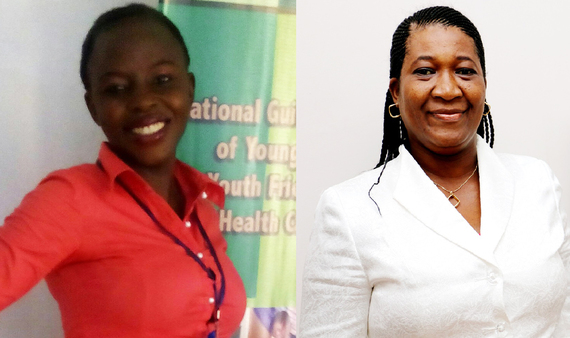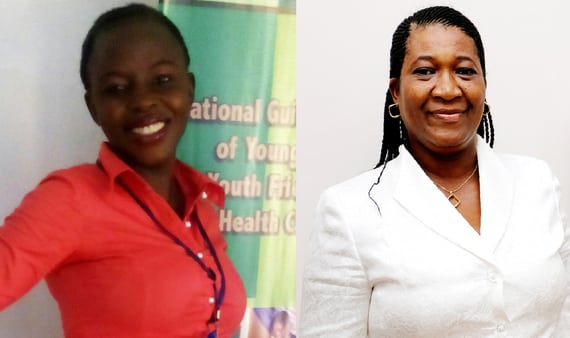A discussion with Henrietta Itsemekhona and Rosemary Adejoh of Women Friendly Initiative, an NGO which conducts advocacy to improve policies for comprehensive RMNCH services and promotion of access to youth-friendly SRH services.
Champions for Change (C4C) is pleased to continue our ‘Meet the Champions’ Series. This bi-monthly blog series highlights the work of 24 Nigerian leaders currently participating as C4C champions. C4C’sChampions in Nigeria are working together to save the lives of mothers, children, and young women through innovative advocacy and leadership development. Nigeria is Africa’s largest economy, and yet tens of thousands of women and children die there each year due to lack of maternity care, preventable disease, and poor health infrastructure, among other causes. This series brings a diversity of perspectives from around Nigeria to the table to discuss this critical moment in Nigeria’s history and how Nigerians can work together to build a healthy future for all.

Rosemary Adejoh, Program Associate, and Henrietta Itsemekhona, Reproductive Health Officer, Women Friendly Initiative
As our first year cohort begins the implementation of their C4C sponsored projects, we further the series with an interactive discussion with Henrietta Itsemekhona and Rosemary Adejoh of Women Friendly Initiative, a non-governmental organization which conducts advocacy to improve the policy environment for comprehensive RMNCH services and promotion of access to adolescent and youth friendly sexual and reproductive health services, particularly primary and secondary care. The organization is based in Kuje, Abuja and implements national, state, and local activities with a focus in Bauchi and Gombe States.
Tell us a little about yourself:
Henrietta: I was a child of destiny, raised by a humble family from Edo State. As the first female child the pressure to get married, even during secondary school, was unbearably strong. Despite the pressure, a strong instinct in me resisted this influence. I rather had the desire to pursue my career as a professional nurse. I proceeded to the School of Nursing and Midwifery, FCT, Abuja to go through a training as a professional nurse and midwife which was completed in year 2000. Working with Women Friendly Initiative (WFI) as the Reproductive Health Advisor is a long standing dream fulfilled because of the series of experiences I had while undergoing the nursing and midwifery trainings as well as my community-based field experiences. Currently I am completing a degree program in Sociology at the University of Abuja.
Rosemary: I am the fourth child of a family of eight. I was born Kogi State but grew up in Plateau State. I earned a Bachelor’s Degree in General and Applied Psychology from the University of Jos, Nigeria in 2008. I currently work with Women Friendly Initiative (WFI) as a Program Associate.
What led to your involvement in RMNCH work? What is the issue you are most passionate about in the field of RMNCH?
Henrietta: As a young student midwife in 1996-1998, I witnessed many preventable maternal deaths in communities where we were posted for clinical experiences. One classical case was that of a woman who was brought to the Primary Health Care (PHC) facility at the third stage of labour after being mismanaged by a community-based Traditional Birth Attendant. The baby was delivered but the placenta was retained. Because she had significant blood lose prior to arriving at the health center, coupled with no transport system to refer to next level, the mother died. From that point, I had an inner anger to fight against any preventable factor that propels maternal death however I can.
Rosemary: My passion for young girls motivated me to volunteer as a facilitator in the Family and Community Life Re-Orientation (FACOR) program during my National Youth Service Corps in 2008-2009, Lagos State. Many adolescent girls have unprotected sexual activity and as a consequence, there is an increasing incidence of unwanted pregnancy among adolescent school girls in Nigeria, which constitutes a major public health problem. My focus revolves on reawakening societal moral values, parental involvement in education relating to sexuality and advocating for policy reforms to provide a platform for continuous education for the girl child even while pregnant.
Why did you opt to be part of the C4C program? What skills do you hope to acquire and what do you intend to do with this new knowledge?
Henrietta: C4C has provided the required platform to fulfill my anger against cultural and attitudinal behaviors that militate against women and girls in our communities. With C4C, the advocacy skills necessary to complement my professional experiences in the fight against maternal death factors are being acquired. Fortunately, the policy guidelines needed to help increase young people’s access to primary level facilities have been developed and launched by WFI. The C4C project assists by providing advocacy skills to disseminate, popularize and gain stakeholders’ commitment for the implementation of the policy guidelines.
Rosemary: The C4C project paved the way to increase my knowledge and skills in advocacy strategies. I also hope to improve my competency and boldness in addressing sexuality issues with high-ranking officers as well as my skills in addressing sexuality issues relating to girls and women of child bearing age and collaboration for positive results. Hopefully this goal can be achieved through sustained advocacy for implementation of the National Guidelines for Promoting Access of Young People to Adolescent & Youth Friendly Services in Primary Health Care Facilities in Nigeria, a document developed by WFI in collaboration with the Federal Ministry of Health and National Primary Health Care Development Agency.
What is the biggest challenge you face in your work?
Henrietta: Our primary health care centers are expected to be the first point of treatment, offering counseling and referral for young girls who become pregnant or are sexually harassed and need help. Unfortunately, most providers at PHC levels do not have the skills needed to counsel or deal with issues of young girls. Thus, the biggest challenge is getting the policy guidelines on Adolescent and Youth Friendly Services implemented at PHCs so that we can empower pregnant and/or sexually harassed girls and provide contraceptive services.
Rosemary: Nearly one-third of the Nigerian population are between ages 10 and 24; yet this group faces enormous challenges in accessing services especially in relation to sexual and reproductive health. Fear of condemnation, stigma by society and the negative attitudes of health workers dissuade young people from seeking services where they exist. This is our biggest challenge.
What successes are you most proud of in your professional career?
Henrietta: Gracefully, my most proud professional career achievement is yet to come. I will fulfill it when youth can freely talk with parents, teachers and health providers about contraceptives, pregnancy related challenges, relationship challenges, and sexual challenges. However, my work with WFI has exposed me to advocate for free contraception for women, build capacity of providers in hard-to-reach communities and supply delivery kits to indigent mothers.
Rosemary: Being part of WFI’S team accorded me an opportunity to interact with hearing impaired girls. I currently have a bi-monthly meeting with them on sexual reproductive health and rights.
What is the most innovative aspect of the work of your organization?
Henrietta: For me, the most innovative aspect of WFI is building skills for youth to campaign against early marriage and encourage girl child education. In 2010 WFI worked in Gombe State to push for compulsory girl child education up to the secondary school level. That bill went through and was passed in the state.
Rosemary: For me the most innovative work of WFI is the successful implementation of a demand-creation model of integrating adolescent and youth friendly services in Primary Health Care facilities in Pegi and Kiyi communities in Kuje, Abuja.
Why is advocacy for RMNCH important in communities/states in Nigeria?
Henrietta: Community-level advocacy translates directly to service delivery. If community leaders and stakeholders commit to issues concerning SRH, it is easier to hold them responsible to such commitments. Community stakeholders are more stable compared to political leaders at state and federal levels.
Rosemary: Multi-level advocacy is essential to ensure that achievements are sustainable beyond the duration of projects and programs. It also improves service uptake and eliminate delays.
What is your vision for the future of Nigeria’s Health System? What would be different if women newborns and children had adequate access to good quality health services and information?
Henrietta: My dream for the Nigerian Health System is one that runs without being driven by individuals or groups. A system where all the lofty policies and international conventions are easily translated to concrete deliverables and actions. A system that does not victimize the girl-child or women of child-bearing age. A system that can crash the unacceptable, unbearably high maternal mortality rate in Nigeria.
Rosemary: I look forward to a Nigerian Health System in which every mother and child will have unhindered access to good quality health care service delivery; a system where policies will be effectively translated into action. A system where adolescents and youth can make fully informed choices in regards to their sexual and reproductive health would be ideal.
What is your favorite thing to do when you want to relax and have fun?
Henrietta: I read the word of God and meditate on it to obtain wisdom. I also listen to news and read books and newspapers that share information related to health.
Rosemary: I love to read newspapers and motivational books and listen to inspirational music.
Is there anything else you would like to share about yourself and your work?
Rosemary: As an advocate for RMNCH, the sky is just the beginning for me. I aspire to be an active voice for vulnerable, disadvantaged women and girls by bridging the divide between them and their hopes for a better world.
Henrietta: My best is yet to come as an advocate of change. I wish to grow to a level where my name becomes a household name among disadvantaged women, deprived girls and passionate women advocates.
Please complete this statement: I am a Champion for Change because…
Rosemary: … I believe every mother and child has a right to quality health care services.
Henrietta: I am… committed to the freedom for women caged by an obnoxious culture and selfish leaders.
What is the most fun thing you have done in the past year?
Henrietta: During the C4C advocacy training (despite the technical complexity that is involved) there were many things which I enjoyed, most especially the various outings. There was also a lot of discussion on working with young people including understanding their approach to things, their thinking process and the language they use in identifying issues related to reproductive health.
Rosemary: This past year I organized a group of WFI-trained female youth providers and brought them to 14 secondary schools in the FCT to educate their peers on menstrual hygiene and the use of contraceptive commodities with practical demonstration. We also distributed free sanitary pads to the female students.
My favorite memory from my work is…
Henrietta:… seeing well-informed women and youth coming to the clinic to access vital information on reproductive health and request assistance when needed.
When I think about my childhood, I feel…
Rosemary: … that I’m right on track fulfilling my dreams.
We invite you to follow us on Twitter at @C4C_Champions and use the hashtag #MeetTheChampions to engage more closely with the blog series, the work of the 24 leaders whose work is being highlighted, and the larger conversation surrounding reproductive, maternal, newborn and child health in Nigeria.
Champions for Change leverages a program model developed by its sister initiative, Let Girls Lead, which has contributed to improved health, education and livelihoods for more than 7 million girls globally since 2009. This powerful model drives change through the passage of national laws, implementation of programs and distribution of funds to ensure access to quality healthcare, education and economic opportunity.
Champions for Change and Let Girls Lead are headquartered at the Public Health Institute in Oakland, CA, a leader in global health and development for 50 years.
Follow Champions for Change on Twitter:www.twitter.com/C4C_Champions


